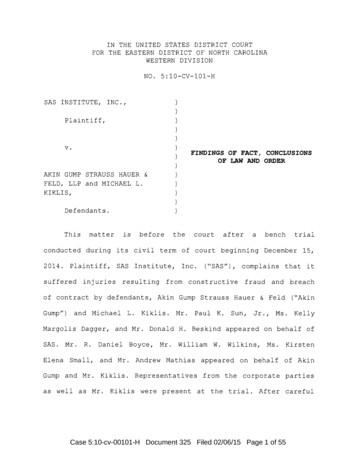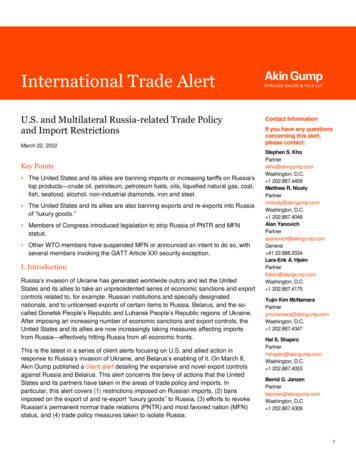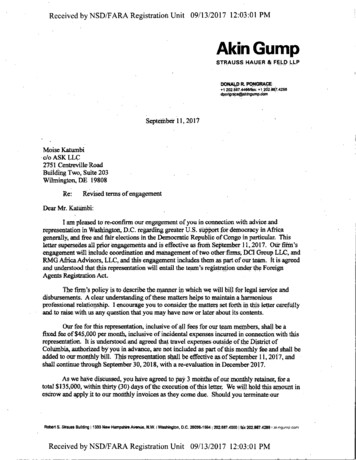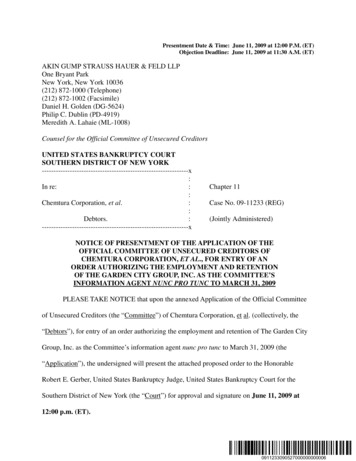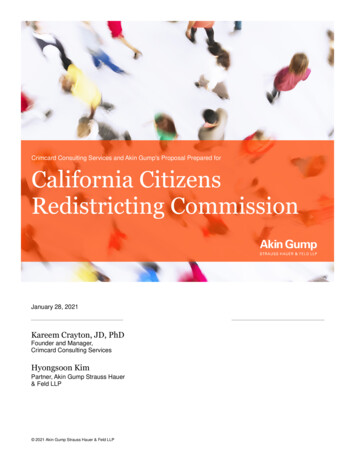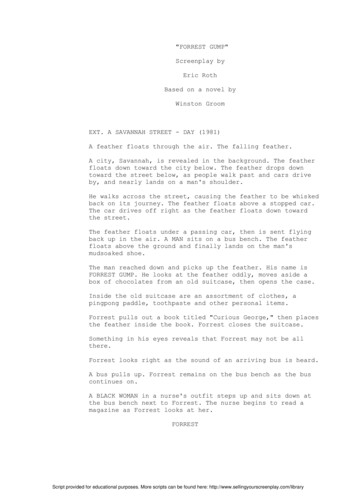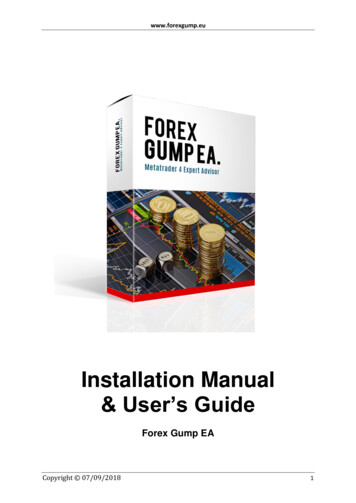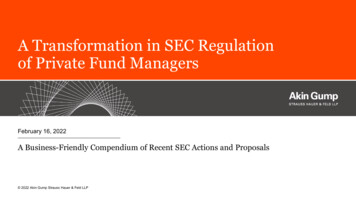
Transcription
A Transformation in SEC Regulationof Private Fund ManagersFebruary 16, 2022A Business-Friendly Compendium of Recent SEC Actions and Proposals 2022 Akin Gump Strauss Hauer & Feld LLP
DisclaimerThe information in this presentation is intended to provide a high-level summary and general overview of the subjectmatter for discussion purposes and may not be relied upon by any party for any purpose. The information is not intendedto be comprehensive and does not constitute, and should not be taken to be, legal, or any other form of, advice. If youwish to obtain legal advice or further information on any issue raised by this briefing, please get in touch with one of yourusual contacts at Akin Gump Strauss Hauer & Feld LLP. 2022 Akin Gump Strauss Hauer & Feld LLP2
TopicsOverview .4“Hedge Clauses,” Liability Limitations, and Fiduciary Status .7Prohibited Activities .12Quarterly Statements – Fee and Expense Disclosures .16New Audit Requirement .20Written Annual Compliance Review .22Focus on Adviser-Led Secondaries 24Recordkeeping Changes .27The Form PF Proposal .29Proposed Cybersecurity Rules .32The Beneficial Ownership Proposal .37The Large Swap Position Reporting Proposal . .43Next Steps 48Key Contacts .50 2022 Akin Gump Strauss Hauer & Feld LLP3
Overview 2022 Akin Gump Strauss Hauer & Feld LLP4
A Significant Transformation in SEC RegulationIn recent weeks, the U.S. Securities and Exchange Commission (the “SEC”) has kicked off a wholesale transformation in the regulation of theprivate funds industry. These actions include rule proposals, enforcement actions, and SEC Staff guidance that, taken together, represent ashift to direct regulation on a scale never seen before in this segment of the industry. On January 26, 2022, the SEC proposed amendments to Form PF, Amendments to Form PF to Require Current Reporting and AmendReporting Requirements for Large Private Equity Advisers and Large Liquidity Fund Advisers (the “Form PF Proposal”), that will requirenear-real time SEC reporting of adverse events. On January 27, 2022, the SEC Division of Examinations issued a Risk Alert, Observations from Examinations of Private Fund Advisers (the“Risk Alert”), outlining common deficiencies. On February 9, 2022, the SEC proposed new and amended rules under the Investment Advisers Act of 1940 that would change the amountof direct supervision and regulation applicable to private fund managers:– Private Fund Advisers; Documentation of Registered Investment Adviser Compliance Reviews (the “Private Funds Proposal”); and– Cybersecurity Risk Management For Investment Advisers, Registered Investment Advisers, Registered Investment Companies andBusiness Development Companies (the “Cybersecurity Proposal”). On February 10, 2022, the SEC proposed amended ownership reporting rules under the Securities Exchange Act of 1934, Modernization ofBeneficial Ownership Reporting (the “Reporting Proposal”). On December 15, 2021, the SEC proposed new rules under the Securities Exchange Act of 1934 that would require the reporting of largeswap positions and prohibit fraud, manipulation or deception in connection with security-based swaps (the “Large Swaps Position ReportingProposal”). 2022 Akin Gump Strauss Hauer & Feld LLP5
Use of this PresentationTo aid our clients and friends in preparing for these impending changes, this presentation provides highlights of some keypoints of the SEC’s proposals and other transformative actions. It is intended to provide legal and compliance personnel,as well as investment and operations personnel, with a practical way to understand how the SEC’s rapidly evolvingregulatory agenda will impact private fund managers.While it is too early to predict exactly what steps will be required, we do expect most of the proposed changes to beadopted. As a result, it is likely that all private fund managers will need to take at least some of the following steps: Specific assessments of the impact of these proposed changes on their businesses; Careful and extensive reviews of offering documents, fund organizational documents, and management agreements; Discussions with investors and clients on the impending changes; and Reviews of staffing levels in and other resources available to legal and compliance departments.Unlike many rulemakings, some of these momentous changes apply to investment advisers that are not required to beregistered with the SEC (e.g., exempt reporting advisers), so these actions will need to be undertaken by a large numberof managers. 2022 Akin Gump Strauss Hauer & Feld LLP6
“Hedge Clauses,” LiabilityLimitations, and Fiduciary Status 2022 Akin Gump Strauss Hauer & Feld LLP7
Hedge Clauses and Fiduciary Standards“Hedge clauses” (provisions in an advisory agreement that purport to limit an adviser’s liability) are a direct focus of theRisk Alert and also of the Private Funds Proposal’s “Prohibited Activities” (the “Prohibited Activities Proposal”). The Risk Alert cited advisers that included “potentially misleading hedge clauses” that “purported to waive or limit theAdvisers Act fiduciary duty except for certain exceptions.” The SEC also recently brought an enforcement action against an investment adviser premised on allegations that a“hedge clause” misled retail clients.This focus is based on the SEC’s view that advisers are subject to a “federal fiduciary duty” and language in the 2019Fiduciary Interpretation, which acknowledged that a manager’s “fiduciary duty must be viewed in the context of theagreed-upon scope of the relationship between the adviser and the client” but expressly prohibited, “regardless of thesophistication of the client,” contract provisions such as: a statement that an adviser will not act as a fiduciary; a blanket waiver of all of an adviser’s conflicts of interest; and a waiver of any specific obligation under the Advisers Act. 2022 Akin Gump Strauss Hauer & Feld LLP8
Comprehensive CapitalIn the recent Comprehensive Capital Management case, the SEC took issue with a limitation of liability utilized ininvestment management agreements with retail clients. The hedge clause (revised after an earlier version was criticized on examination) stated that the adviser:– “will be liable only for acts of gross negligence or willful misconduct;”– “will not be liable for any act or omission by brokers or other agents selected with “reasonable care;” and– “will not be liable for any incidental, indirect, special, punitive or consequential damages,”subject to a savings clause stating that federal and state securities laws may “impose liability on persons who act ingood faith and nothing in this Agreement shall serve to waive or limit any rights Client may have under those laws.” The SEC determined that the agreement’s hedge clause was “inconsistent with an adviser’s fiduciary duty” and with theFiduciary Interpretation “because it may mislead CCM’s retail clients into not exercising their legal rights.” The SEC order also asserted that the agreement’s statement that CCM will be liable only for its “own acts of grossnegligence or willful misconduct” was “an inaccurate statement of the liability standards under the federal securities lawsas they apply to investment advisers” and, accordingly, violated Section 206(2) of the Advisers Act.While the SEC order emphasized the fact that CCM’s client base was primarily retail, the prohibitions in the ProhibitedActivities Proposal would not be limited to retail clients. 2022 Akin Gump Strauss Hauer & Feld LLP9
Prohibited Activities ProposalThe positions taken in Comprehensive Capital were echoed in the January Risk Alert, where the Division of Examinationsasserted that:Whether a clause in an agreement, or a statement in disclosure documents provided to clients and investors, thatpurports to limit an adviser’s liability (a “hedge clause”) is misleading and would violate Sections 206(1) and 206(2) ofthe Advisers Act depends on all of the surrounding facts and circumstances. EXAMS staff observed private fundadvisers that included potentially misleading hedge clauses in documents that purported to waive or limit the AdvisersAct fiduciary duty except for certain exceptions, such as a non-appealable judicial finding of gross negligence, willfulmisconduct, or fraud. Such clauses could be inconsistent with Sections 206 [an anti-fraud provision] and 215(a)[validity of contracts that purport to effect impermissible waivers] of the Advisers Act.This focus on narrowing hedge clauses and agreed-upon limitations on liability ultimately culminated in the ProhibitedActivities Proposal, which proposes a categorical prohibition on manager from seeking:reimbursement, indemnification, exculpation, or limitation of its liability by the private fund or its investors for abreach of fiduciary duty, willful misfeasance, bad faith, negligence, or recklessness. 2022 Akin Gump Strauss Hauer & Feld LLP10
Implications and Next StepsImplicationsNext Steps Expect intense SEC focus on all hedge clauses andliability limitations. Identify all hedge clauses and limitations of liability in fundPPMs, LPAs and other constituent agreements. Prepare for a special focus on hedge clauses in IMAswith retail clients, but note that the Prohibited ActivitiesProposal would apply to all clients. Review all investment management agreements with retailclients. The Prohibited Activities Proposal could have a largeimpact on insurance products for managers, in terms ofimpacting both the cost and the availability of liabilityinsurance products. Consider communicating the adverse impacts on theindustry and investors from adoption of the ProhibitedActivities Proposal. The Prohibited Activities Proposal could result in apotential private right of action in contract law. 2022 Akin Gump Strauss Hauer & Feld LLP11
Prohibited Activities 2022 Akin Gump Strauss Hauer & Feld LLP12
Prohibited “Preferential Treatment”The SEC believes that increased transparency “would better inform investors regarding the breadth of preferentialtreatment, the potential for those terms to affect their investment in the private fund, and the potential costs (includingcompliance costs) associated with these preferential terms.”Under the Prohibited Activities Proposal, all private fund advisers (including exempt reporting advisers) would beprohibited (irrespective of disclosures or investor agreements) from providing preferential terms like the following to certaininvestors: Redemption/Liquidity. Private fund advisers would be prohibited from granting an investor in the private fund or in asubstantially similar pool of assets the ability to redeem its interest on terms that the adviser “reasonably expects to havea material, negative effect” on the other investors. Transparency. Private fund advisers would be prohibited from providing information regarding portfolio holdings orexposures of the fund if the adviser “reasonably expects to have a material, negative effect” on the other investors.Other Preferential Treatment Requires Disclosure. Private fund advisers would be prohibited from providing any otherpreferential treatment to any investor in the private fund or in a substantially similar pool of assets unless the adviserprovides detailed written disclosures (for example, specific ranges of fee discounts) to prospective and current investors ina private fund. In proposing this change, the SEC noted with approval the effect of the EU Alternative Investment FundManagers Directive (AIFMD)’s preferential treatment disclosure requirements on side letter practice.(Of course, whether any terms are “preferential” would depend on the facts and circumstances.) 2022 Akin Gump Strauss Hauer & Feld LLP13
Prohibited Financial TransactionsThe Prohibited Activities Proposal would also prohibit all private fund advisers (including exempt reporting advisers) fromengaging in a number of activities and practices (which the SEC has deemed to be “contrary to the public interest and theprotection of investors”), including:– Charging accelerated monitoring fees and other fees for unperformed services;– Passing through fees and expenses associated with an examination of the adviser or its related persons;– Passing through fees and expenses associated with an investigation of the adviser or its related persons;– Charging the private fund for any regulatory or compliance fees or expenses of the adviser or its related persons;– Seeking reimbursement, indemnification, exculpation, or limitation of its liability for certain activity (discussed below);– Reducing the amount of an adviser clawback by the amount of certain taxes;– Charging fees or expenses related to a portfolio investment on a non-pro rata basis; and– Borrowing or receiving an extension of credit from a private fund client. 2022 Akin Gump Strauss Hauer & Feld LLP14
Implications and Next StepsImplicationsNext Steps Implementation of the Prohibited Activities Proposal willhave obvious direct effects on managers, but could alsohave unintended adverse direct and indirect effects oninvestors. Review the list of prohibited activities and transactions andcompare them to an adviser’s current practices. These proposed changes could necessitate changes inan adviser’s overall compensation arrangements. 2022 Akin Gump Strauss Hauer & Feld LLP Seek to quantify the effects of the proposed prohibitionscoming into force. Assess whether any of the prohibited activities wouldprevent or disincentivize a private fund manager fromtaking steps that would benefit investors.15
Quarterly Statements –Fee and Expense Disclosures 2022 Akin Gump Strauss Hauer & Feld LLP16
Quarterly Fee and Expense DisclosuresIn the Private Funds Proposal, the SEC claimed that investors “often lack transparency regarding the total cost” of privatefund fees and expenses. Accordingly, the proposal requires registered private fund advisers to prepare and distribute aquarterly statement to private fund investors, generally within 45 days after each quarter end, showing: Adviser Compensation: A detailed accounting (i.e., separate line items) of compensation, fees and other amountsallocated or paid to the adviser and its “related persons.” Fund Expenses: A detailed accounting (again, separate line items) of other fees and expenses paid by the private fund. Offsets, Rebates and Waivers: Disclosures reflecting adviser compensation and fund expenses before and after theapplication of any offsets, rebates or waivers. Portfolio Investment Compensation: A detailed accounting of all portfolio company/investment compensation allocated orpaid (directly or indirectly) to an adviser or its related persons. Private Fund Ownership. The private fund’s ownership percentage of each covered portfolio company/investment.The proposed quarterly statement rule would also require: Prominent disclosure of calculation methodologies; and Cross references to the relevant sections of the private fund’s offering and constituent documents.The reporting would be done at the private fund or portfolio investment level (and not on an investor-by-investor basis). 2022 Akin Gump Strauss Hauer & Feld LLP17
Performance DisclosuresThe Private Funds Proposal also requires quarterly private fund performance disclosures: Illiquid funds: Performance based on the internal rate of return and a multiple of invested capital.– The SEC proposed to define an “illiquid fund” as any private fund with a limited life span, limited capital raising period,and a predominant strategy of returning disposition proceeds to investors that does not routinely acquire market-tradedsecurities and derivative instruments.– Closed-end funds that do not offer periodic redemption rights generally fall under “illiquid funds.” Liquid Funds: Performance based on net total return on an annual basis since the fund’s inception, over prescribed timeperiods and on a quarterly basis of the current year.– The SEC proposed to define a “liquid fund” as “any private fund that is not an illiquid fund.”The SEC noted that information in the quarterly statements would not be considered an “advertisement” under themarketing rule, but an adviser offering “new or additional investment advisory services in regard to the securities in thequarterly statement would need to consider whether such information would be subject to the marketing rule.” 2022 Akin Gump Strauss Hauer & Feld LLP18
Next StepsImmediate Next StepsBroader Actions Managers should review all fee and expense items todetermine the impact of broad disclosures. Consider whether these proposed disclosures raisecontractual, trade secret or other legal concerns for themanager of the funds. Compensation at all levels should be reviewed, includingcompensation received by entities that may or may notbe deemed to be affiliates. Determine whether there are unanticipated negative effectson investors that should be brought to the SEC’s attention. Consider engaging with the SEC on its questions of:– Should there be investor-specific disclosures?– Should different economic arrangements be disclosed inthe quarterly statements?– Should this be applied to all advisers (not just RIAs)?– Should the SEC consider alternative approaches, suchas prohibiting the “2 and 20” model? Or compensationfrom portfolio companies? 2022 Akin Gump Strauss Hauer & Feld LLP19
New Audit Requirement 2022 Akin Gump Strauss Hauer & Feld LLP20
Broader Audit RuleThe Private Funds Proposal would require registered private fund advisers to deliver an annual (and upon liquidation)financial statement audit. This is intended to protect private fund investors against misappropriation of fund assets and to“provide an important check on the adviser’s valuation of private fund assets, which often serve as the basis for thecalculation of the adviser’s fees.”ImplicationsNext Steps While based on the Custody Rule, compliance with thatrule would not satisfy the requirements of this proposal(and vice versa). Managers should determine whether this rule will imposeadditional costs on investors. May effectively end use of the “surprise examination.” Auditor required to notify the Division of Examinations uponthe auditor’s termination or issuance of a modified opinion(including a qualified opinion, an adverse opinion and adisclaimer of opinion). 2022 Akin Gump Strauss Hauer & Feld LLP21
Written Annual Compliance Review 2022 Akin Gump Strauss Hauer & Feld LLP22
Written Annual Compliance ReviewThe Private Funds Proposal would revise Rule 206(4)-7(b), as follows, to require that the annual review be in writing:Annual review. Review and document in writing, no less frequently than annually, the adequacy of the policies andprocedures established pursuant to this section and the effectiveness of their implementationImplicationsNext Steps It will now be essential that all annual reviews are inwriting and available to the SEC upon request. Ensure that the annual review (including the written report)is on an annual cycle. Any advisers that depend on an oral presentation of the Ensure that the annual review written report documentsannual review would need to ensure that they also createboth (i) adequacy of policies and (ii) effectiveness ofand retain adequate written documentation of the review).implementation. 2022 Akin Gump Strauss Hauer & Feld LLP23
Focus on Adviser-Led Secondaries 2022 Akin Gump Strauss Hauer & Feld LLP24
Adviser-Led Secondaries RuleThe Private Funds Proposal contains an “Adviser-Led Secondaries Rule” that requires a registered private fund adviser toprovide investors with: A fairness opinion from an independent provider would opining on the fairness of the price being offered and A material business relationships summary summarizing any material business relationships the adviser or any of itsrelated persons has or has had within the past two years with the independent opinion provider.The SEC believes that this rule would provide a check against “an adviser’s conflicts of interest in structuring and leadinga transaction from which it may stand to profit at the expense of private fund investors.”The SEC has requested for comments, including the scope of the rule and the definitions and whether thefairness opinion should be distributed to investors or only upon request. 2022 Akin Gump Strauss Hauer & Feld LLP25
Implications and Next StepsImplicationsNext Steps Under the Adviser-Led Secondaries Rule, a competitivesales process would not exempt the adviser from aobtaining a fairness opinion. Consider whether a fairness opinion addresses theconcerns raised by the SEC or whether alternativeapproaches, such as competitive sales processes andLPAC approvals mitigate conflicts. Industry participants would need to coordinate with anindependent provider in order for the fairness opinion tobe shared with the fund’s investors. LPAC approval and processes would be dependent onthe fairness opinion, which would not necessarily providethe highest value to fund’s selling investors. Proposed rule is not sufficiently clear as to the scope ofthe fairness opinion and types of transactions covered. Consider whether the proposed rule provides adequateclarity on the scope of the fairness opinion in light of thenature of the particular advisor-led secondary. Consider whether independent providers would be in aposition to share fairness opinions as described in theAdviser-Led Secondaries Rule. Proposed rule does not address sponsor liability in theevent transactions proceed despite an unfavorable opinionor if one is not able to be obtained. 2022 Akin Gump Strauss Hauer & Feld LLP26
Recordkeeping Changes 2022 Akin Gump Strauss Hauer & Feld LLP27
Recordkeeping ChangesThe Private Funds Proposal would amend the recordkeeping rule to accommodate the new documentation requirements(e.g., under the quarterly fee and expense statements, audits, adviser-led secondaries, and preferential treatmentproposals).ImplicationsNext Steps The SEC asked for comment on whether the books and For RIAs: Ensure that the new requirements dovetail withrecords rule should require not only registered investmentexisting systems and processes.advisers but also other advisers such as exempt reporting For ERAs: Consider the effect on the business from newadvisers to retain written notices in relation to the aboverequirements. Consider whether SEC outreach in the formlisted rules.of a comment letter is warranted. 2022 Akin Gump Strauss Hauer & Feld LLP28
The Form PF Proposal 2022 Akin Gump Strauss Hauer & Feld LLP29
Proposed Form PF ChangesThe Form PF Proposal would change the reporting obligations by, among other things, expanding the scope of informationrequired to be reported by large private equity fund advisers and large liquidity fund advisers.In particular, the Form PF Proposal would amend the Form PF to require the reporting of adverse events, generally on aone business day requirement, to the SEC:Private Equity ManagersHedge Fund ManagersMore information required on Extraordinary (i.e., 20% in ten days) investment losses; Fund strategies; Significant margin/counterparty default events and otherchanges in prime broker relationships; Leverage; Portfolio company financings and borrowings; Investments in different levels of the capital structure ofa portfolio company; and Changes in unencumbered cash; Operations events; and Certain withdrawal and redemption events. Portfolio company restructurings or recapitalizations. 2022 Akin Gump Strauss Hauer & Feld LLP30
Implications and Next StepsImplicationsNext Steps This is expected to result in private fund managersadopting an “8-K style culture,” although the filing periodis one business day as opposed to four business daysfor 8-Ks. Fund managers should consider implementing operationand reporting controls to capture the occurrence of reporttriggering events and a filing process to promptly make thefiling. The SEC enumeration of investments at different levelsof a capital structure portends an enhanced SEC focuson conflicts arising from such multi-tier investments inthe same portfolio company. Fund managers should consider how the increased cost ofthese filings will be accounted if the Private Fund Proposalis adopted in a manner that prohibits fund managers frompassing along their compliance costs to their fund clients. For private equity managers, the reporting thresholddrops from 2 to 1.5 billion in private equity fundassets under management. In light of disclosure regarding investments at differentlevels of a capital structure, fund managers should applyincreased conflicts and compliance analysis to any suchinvestments as they may be an exam focus or even anexam prompt for the SEC. 2022 Akin Gump Strauss Hauer & Feld LLP31
Proposed Cybersecurity Rules 2022 Akin Gump Strauss Hauer & Feld LLP32
Annual ReviewThe Cybersecurity Proposed Rules would require registered investment advisers to, at least annually: Review and assess the design and effectiveness of their cybersecurity policies and procedures. Prepare a written report, which would:– describe the annual review, assessment and any control tests performed; and– explain the results. Document any cybersecurity incident that occurred since the date of the last report. Discuss any material changes to the policies and procedures since the date of the last report. 2022 Akin Gump Strauss Hauer & Feld LLP33
ReportingThe Cybersecurity Proposed Rules would include a new reporting rule requirement and related proposed Form ADV-Cwhich would be require an adviser to report significant cybersecurity incidents to the SEC. An adviser would be required to submit proposed Form ADV-C promptly but in no event more than 48 hours after havinga reasonable basis to conclude that a “significant adviser cybersecurity incident” had occurred or is occurring. “Significant adviser cybersecurity incident” would be defined as: “a cybersecurity incident, or a group of related incidents,that significantly disrupts or degrades the adviser’s ability, or the ability of a private fund client of the adviser, to maintaincritical operations, or leads to the unauthorized access or use of adviser information, where the unauthorized access oruse of such information results in: (1) substantial harm to the adviser, or (2) substantial harm to a client, or an investor ina private fund, whose information was accessed”. Form ADV-C would be confidential and not available to public disclosure.However, the rule would amend Form ADV Part 2A to require (public) disclosure of cybersecurity risks and incidents thatcould materially affect the advisory relationship. 2022 Akin Gump Strauss Hauer & Feld LLP34
RecordkeepingThe Cybersecurity Proposed Rules would amend the books and records rule to require advisers to maintain: Copy of their cybersecurity policies and procedures in effect and any time within the past five years Copy of the adviser’s written report documenting the annual review in the last five years Copy of any Form ADV-C filed by the adviser in the last five years Records documenting the occurrence of any cybersecurity incident Records documenting the occurrence of a cybersecurity incident may include event or incident logs. 2022 Akin Gump Strauss Hauer & Feld LLP35
Cybersecurity Proposed Rule ChangesImplicationsNext Steps Cybersecurity assessments will be incorporated intowritten annual reviews. Managers should review and revise their incident responseplans and other cybersecurity policies and procedures. Formalized, practiced incident response will be critical totimely comply with the Form ADV-C requirement ascurrently proposed. Managers should also consider establishing and reviewingcybersecurity incident log, including events from thirdparties. Close review of third-party incidents will be essential forcompliance. Managers should also evaluate third-party contracts toensure contractual commitments that would enable timelyreporting to the SEC. Managers should conduct a tabletop exercise to ensurefamiliarity with the plan and establish ability to report within48 hours to the SEC. Managers should consider what incidents would “lead tothe unauthorized access or use of adviser information” andhow to effectively respond to such incidents. 2022 Akin Gump Strauss Hauer & Feld LLP36
The Beneficial Ownership Proposal 2022 Akin Gump Strauss Hauer & Feld LLP37
Accelerated TimingThe Beneficial Ownership Proposal would dramatically shorten deadlines for Schedule 13D and Schedule 13G filings:IssueInitial FilingDeadlineAmendmentTriggeringEventCurrent Schedule13DProposed NewSchedule 13DCurrent Schedule 13GProposedNew Schedule 13GWithin 10 days afteracquiring beneficialownership of morethan 5% or losingeligibility to file onSchedule 13G. Rules13d-1(a), (e), (f) and(g).Within five days afteracquiring beneficialownership of more than5% or losing eligibilityto file on Schedule13G. Rules 13d-1(a),(e), (f) and (g).Qualified Institutional Investors &Exempt Investors:45 days after calendar year-end inwhich beneficial ownership exceeds 5%.Rules 13d-1(b) and (d).Qualified In
2022 Akin Gump Strauss Hauer & Feld LLP Disclaimer The information in this presentation is intended to provide a high-level summary and general overview of the subject
